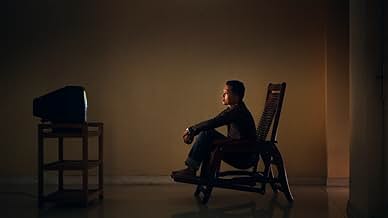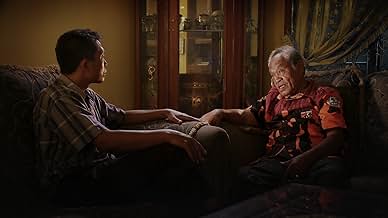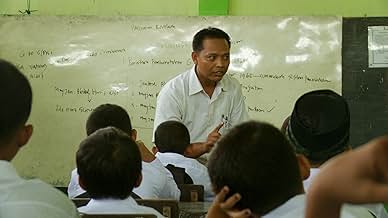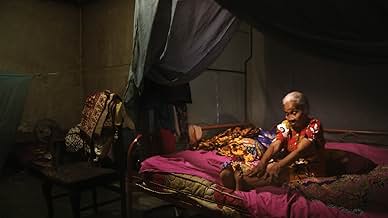A family that survived the genocide in Indonesia confronts the men who killed one of their brothers.A family that survived the genocide in Indonesia confronts the men who killed one of their brothers.A family that survived the genocide in Indonesia confronts the men who killed one of their brothers.
- Nominated for 1 Oscar
- 48 wins & 45 nominations total
- Self - former leader of death squad
- (archive footage)
- Self
- (voice)
- (as Josh)
- Self - Sprecher
- (voice)
- (as Achim Schülke)
- Self - reporter, NBC News
- (archive footage)
Featured reviews
The two films work well together, Act of Killing being more overview and focusing on the killers and the political structure/mob rule that is still in power. Act of Killing doesn't particularly explore how they got away with genocide (why the world turned a blind eye), but this is alluded to carefully and specifically in Look of Silence.
I could write so much because the two films together have provoked in me a profound perspective on human horror, which has gripped me most recently with what we see on the news with ISIS (Paris Masacre).
What are human beings capable of, and why is an individual able to make such choices? What are the structures that facilitate the most grotesque of human acts of wickedness upon one another. Do we all contain wickedness, does a killer lurk inside us all? Does fear itself propel the killers - kill or be killed? Are we (cells in the human organism) enacting our worst imaginable terror, excising evil, I kill therefore I am?
Josh Oppenheimer, I applaud your work. The sensitivity and attention to the finest detail employed in your work is, for me, beyond words. The cinematography, colours you choose, balance in composition. Even the subtitles were easy to read. Beautiful lingering pauses. You said of one still scene, a bridge, pale green, a river bank; you have no words to describe how this scene makes you feel, what the scene says. For me this scene (in LoS) is terrifyingly beautiful, sad, the weight of recent history hanging there in the stillness. Embodying the sadness and fear. I love that still scene.
Superb, I do not have the words to describe what your films say to me... I will think about them for a long long time, and watch them again.
Oppenheimer utilised this blood-curdling footage years later, by showing its profound horror to a middle-aged Indonesian man whose brother was an unfortunate victim of the national purge. Acknowledging the explicit nature of his country's past and yearning to learn more, he singlehandedly confronts the perpetrators who executed the killings with Oppenheimer documenting the anxiety-inducing conversations, under the pretence of an eye examination. Through the changing of lenses, this metaphorical dissimulation magnifies the retinas of "Adi's" brother's executors, allowing windows into their darkened souls to widen.
Predictably, much like with Oppenheimer's creatively profound companion piece 'The Act of Killing', these individuals expressed minimal remorse. Proud to serve their nation and glorify their political ideologies. However, the purpose of these bleak confrontations was not to agitate those that committed such atrocities, but to perpetuate a historic generational divide within Indonesia. The current generation educated with false truths to adhere to the current sociopolitical climate. "Communists gouged the eyes out of army generals", students are taught. Yet the truth couldn't be any further from that manipulative fabrication. Everyone seemingly forced into silence regarding the questioning of their own national history. Therefore, producing such an unflinching documentary that dares to question the morality and legitimacy behind one of the worst genocides in recent history, is of paramount importance. Not just to Indonesia, but every nation that endures tainted democracy. Inciting societies to educate themselves and not ignore the grave actions of their previous generation.
Oppenheimer challenges the boundaries of documentary filmmaking once again, crafting uncompromising perceptive enlightenment through one man. A man whom represented the nullified silence of those feared by their own government. A man whom fearlessly questioned the very individuals that shaped his current standard of living. Representing the suffering and fragility of an oppressed society. Understatedly profound, yet consistently unshakeable in nature. The inclusion of iridescent quietude, from expansive shots of village life to close-ups of metamorphosis, overemphasising the extinguished freedom of speech. Many of the confrontations delivering unwavering tyrannical sensibilities likening their ideologies to totalitarian repression, exhibiting minimal sorrow for the thousands they slaughtered. Conversations that rightly bury the words under the skin to those listening. Ranging from indirect threats such as "be careful, what you're doing may be deemed as communist behaviour" to Western influences including "America taught us how to hate communists". Undoubtedly disconcerting.
Reservations for the confrontation with "Adi's" uncle, whom was guarding "communists" before they were massacred, is the sole criticism this documentary obtains. Staged, exploitative and unnecessarily producing familial drama in a nation that is already fragmented and traumatised. Consequently Oppenheimer overstepped the line in that particular instance, despite "Adi's" insistence, creating an artificially uncomfortable atmosphere for the sake of drama.
However, whilst not creatively innovative as his former insight into the Indonesian Genocide, Oppenheimer's The Look of Silence unequivocally nullifies all emotive output, perhaps more so that his previous directorial efforts. It is unflinching. It is uncompromising. It is of paramount significance. We need boundary-testing documentaries like this to truly provide insight and to evoke human right activism. To microscopically magnify the actions of humanity's past and ensure they never happen again. "That's politics. Politics is the process of achieving your ideals", the former commander of civilian militia joyously states with a grimace. "In many ways...".
His second film, "The Look of Silence", coupled with his "The Act of Killing" has created a sea- change in the Indonesian truth, justice and reconciliation movement. Forcing new laws to be written and putting the government in a defensive position against the nation's media.
But Oppenheimer is more than an activist. He's an artist. His films are contemplative, playful and quietly confrontational. His visual attack is succinct, his marriage of form and theme is flawless and his moral intent is thunderous.
Where "Act of Killing" was concerned with a larger study of post-massacre Indonesia, "Look of Silence" chooses a more intimate landscape. Geographically, emotionally and cinematically it is regional. Concerned with a single killing, the men who did it – directly and indirectly - the family it affected and the small village that has lived with questions about other killings like it for fifty years. Where "Act of Killing" lived in absurdist grand cinema, "Look of Silence" exists in tight close-ups of the perpetrators, survivors and truth-seekers. More than anything, more than words, their faces tell the story. So much happens behind the eyes, around the corners of the mouth, in unspoken glances. The horror, doubt, guilt and seemingly impossible reconciliation stirs below the surface. For all the cinematic flex of "Act of Killing", this contained take on the same material, seems more haunted and human.
The star of the film, Adi the eyewear peddler, pursues this mission with intelligence and courage. We meet his family. His happy playful daughter, his thoughtful son, his cautious loving wife, his ageless mother (probably the most engaging character captured on film this year), his wisp of an ancient father, and his memory of a murdered brother, looming over everything. From them he finds the courage to question murderer after murderer face-to-face. The combination of his profession as an optometrist with his quest to seek truth would seem heavy-handed if it were fiction, but nothing here is inauthentic. In showing all of Adi's family, from the fresh and young, to the spent and dying, we see the full arc of life.
Lastly, the film makes a glancing but firm indictment against the American anti-Communist fervor that fed into - and the American corporations that profited from - these killings. It gives strong evidence that the Cold War, the war of ideology and the murder of millions, allowed for, and was even fought for, Western corporate dominance in places like this. And here the grinding up of human beings for profit in this situation is undeniable. Oppenheimer wants to make sure no one involved gets off without having to face, if not their own role in the massacre of millions, then at the very least, their culture's.
And so it goes, the people (wives, mothers, daughters, sons, fathers, husbands), the silence, the haunted jungle hum that fills most of the auditory space in the film, the great and overwhelming significance of it all everything pools together to show us something words alone can't manage. Something about how a horror can be so great that its impact can loom over generations. About living with debilitating fear of those who have claimed power over you through violence. About the most nightmarish tendencies in humanity, and our courageous capacity to overcome the worst of ourselves. About just how difficult it is to look into the eyes of a killer and say, "I know what you did."
And more profoundly, more frighteningly "I know you."
After my viewing of it finished at 7 a.m., I was lowering myself into a warm bathtub when suddenly I became haunted by the feeling that headless bodies were floating past me as if I were in the Snake River where the corpses had been dumped. Indeed, I couldn't put the film out of my head the rest of the day, and haven't since. The film follows an Indonesian man named Adi Runkun whose brother had been brutally murdered in the 1965 purge of 'communists' as he confronts, in the present day and under the pretext of dispensing eye exams, the men who had carried out the killings (and who had boasted and joked about the carnage in "The Act of Killing"). We also see Adi's humane care-taking of his nearly dead father whom he bathes and consoles, and other family members who have had to live among his brother's murderers for decades. What makes this film so effective is how Adi refuses to display any emotion at the killers while the director continues to portray them as human beings rather than monsters (no revenge film this), but Adi's silent stare keeps burning into their souls as they squirm uncomfortably, stubbornly offering lame excuses while refusing any expressions of regret. By this method Oppenheimer makes the film much more of an iconic document of man's inhumanity to man, forcing viewers to contemplate parallels in history, most especially the Nazis who perpetrated the Holocaust in Hitler's Germany.
There is nothing easy about this film, yet it is one of the few films you must not miss if you have a heart that pumps blood.
Oppenheimer returns to the same material he mined in "The Act of Killing," the slaughter of communists in Indonesia in the 1960s. The men who actually supervised the killings are alive and well for the most part, and still exercise a gangsterish kind of control over the country. Communists aren't still being murdered overtly and en masse, but one senses that it would be easy for someone to "disappear" if he/she pushed too hard against authority. "The Act of Killing" stuck close to the murderers, and we watched in stunned disbelief as they gleefully reenacted their killings, the heroes of their own demented movies. "The Look of Silence" follows a man whose brother was murdered as part of the Communist purges before he was even born, and now wants to confront the men who carried out the murder. It's unclear, probably even to himself, what he wants from these confrontations. Possibly just an apology, possibly simple recognition of what they did. The conversations run the gamut from cathartic to downright frightening (one man obliquely hints that he could make very bad things happen to the film's protagonist if he wanted to). But the reaction from all of the killers is essentially the same: the past is the past (even though in Indonesia it isn't), why are you bringing all of this up again, can't we just agree to forget?
Of course agreeing to forget is what makes horrific events like these possible to repeat. The most fascinating interviews are those not with the killers themselves but with the children of the killers, the people who have inherited their parents' legacies (on both sides of the conflict) and now must make something of the world they share. In some cases, the children learn details they never before knew and we watch them process them on screen in real time. It's difficult as a viewer to know how to feel about these inheritors of their parents' actions. On the one hand, they really can't and shouldn't be held accountable for things their parents did when they were children or possibly not yet even born. On the other hand, like it or not, we all inherit our own histories and have to at least acknowledge them, both the good and the bad, if we are to learn from them.
Both "The Look of Silence" and "The Act of Killing" are infuriating to Western viewers who have been raised to believe that freedom and justice eventually triumph and that evil, either individual or systemic, gets punished. These are brilliant films, and while they certainly sow doubts in my head about the state of mankind, I feel like a better person for having seen them.
Grade: A+
Did you know
- TriviaAdi and his family moved thousands of kilometers away to the other side of the country, out from under the shadow of the perpetrators who are still powerful situation in North Sumatra.
- Quotes
Himself, brother of murdered Ramli Rukun: Tell me about that madness.
Himself, former leader the village death squad: Some killed so many people who have gone mad. A man climbed a palm tree, every morning, to call for prayer. Killed too many people. There is only one way to avoid it. Drink the blood or go crazy. But if you drink blood, you can do anything.
Himself, brother of murdered Ramli Rukun: [Testing the eyeglasses] What do you think...
Himself, former leader the village death squad: Salty and sweet. The human blood.
Himself, brother of murdered Ramli Rukun: Pardon?
Himself, former leader the village death squad: Human blood is salty and sweet. I know from experience.
- ConnectionsEdited into P.O.V.: The Look of Silence (2016)
- SoundtracksLukisan Malam
music by E. Sambayon & lyrics by Sakti Alamsyah
performed by Sam Saimun
courtesy of Irama Records
- How long is The Look of Silence?Powered by Alexa
Details
- Release date
- Countries of origin
- Official sites
- Language
- Also known as
- Sessizliğin Bakışı
- Filming locations
- Production companies
- See more company credits at IMDbPro
Box office
- Gross US & Canada
- $109,089
- Opening weekend US & Canada
- $6,616
- Jul 19, 2015
- Gross worldwide
- $157,857
- Runtime
- 1h 43m(103 min)
- Color






























